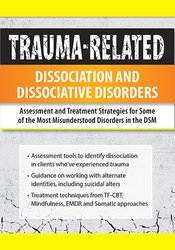

You work with trauma to make a difference.
But developmental trauma and disorganized attachment have profoundly negative effects on those who experience them -- and the signs and symptoms of dissociation can be difficult to recognize, even for clinicians.
And many people with trauma-related dissociation and dissociative disorders actively work to hide their struggles; stigma and shame driving their secrecy and barring them from sharing the full extent of their distress with you. Frightened and confused, many become “revolving door” patients, in and out of the mental health system when the root of their problems can’t be identified.
They are in desperate need of your help.
This recording will prepare you to effectively meet the clinical challenges involved in identifying and treating individuals across the dissociative spectrum.
Key Benefits:
Don’t miss out on this chance to add valuable skills and tools to your trauma practice and ensure those seeking your help don’t become “revolving door” patients.
Purchase this recording today and provide hope and healing to those with trauma-related dissociation and Dissociative Disorders!
| File type | File name | Number of pages | |
|---|---|---|---|
| Manual - Trauma-Related Dissociation and Dissociative Disorders (2.64 MB) | 84 Pages | Available after Purchase | |
| Manual - Trauma-Related Dissociation and Dissociative Disorders - French (2.64 MB) | 84 Pages | Available after Purchase | |
| Manual - Trauma-Related Dissociation and Dissociative Disorders - Italian (2.64 MB) | 84 Pages | Available after Purchase | |
| Manual - Trauma-Related Dissociation and Dissociative Disorders - German (2.64 MB) | 84 Pages | Available after Purchase | |
| Manual - Trauma-Related Dissociation and Dissociative Disorders - Spanish (2.64 MB) | 84 Pages | Available after Purchase |

Greg Nooney, MSW, ACSW, LISW, LCSW, has worked with clients with serious mental illness and dissociative disorders for over 35 years. He’s received specialized training in treating severely dissociated clients and is the author of Diagnosing and Treating Dissociative Identity Disorder: A Guide for Social Workers and All Frontline Staff (National Association of Social Workers Press, 2021).
A highly respected trainer on trauma-related dissociation, dissociative identity disorder, ethics, narrative therapy practices, treating severe trauma, and burnout, Greg shares his years of knowledge and clinical experience with professionals at seminars and conferences throughout the country.
He has worked in mental health centers, psychiatric hospitals, private practice and most recently at Burgess Health Center where he was the director of the mental health section for a decade. He is an adjunct instructor at the University of Iowa School of Social Work and has served as a field instructor for Master of Social Work Students at the University of Iowa, University of Nebraska, and the University of North Carolina. Greg earned his master’s in social work from Loyola University in Chicago and is available to provide workshops and trainings as well as supervision to social workers, and consultations for therapists working with clients with DID. He can be contacted through his website at www.gregnooney.com.
Speaker Disclosures:
Financial: Greg Nooney has an employment relationship with Burgess Mental Health. He receives royalties as a published author and a speaking honorarium from the National Association of Social Workers. Greg Nooney receives a speaking honorarium and recording royalties from PESI, Inc. He has no relevant financial relationships with ineligible organizations.
Non-financial: Greg Nooney is a member of the National Association of Social Workers.
Developmental Trauma, Symptomology and Risk Factors
Clinical Assessment Tools for Trauma and Dissociative Disorders
Problems and Solutions in the Treatment of People with Dissociative Disorders
Therapeutic Techniques that Develop Stability and Safety for Dissociating Clients
Specific Trauma Work for Dissociative Disorder Treatment Plans
Limitations of the Research and Potential Treatment Risks
Please wait ...